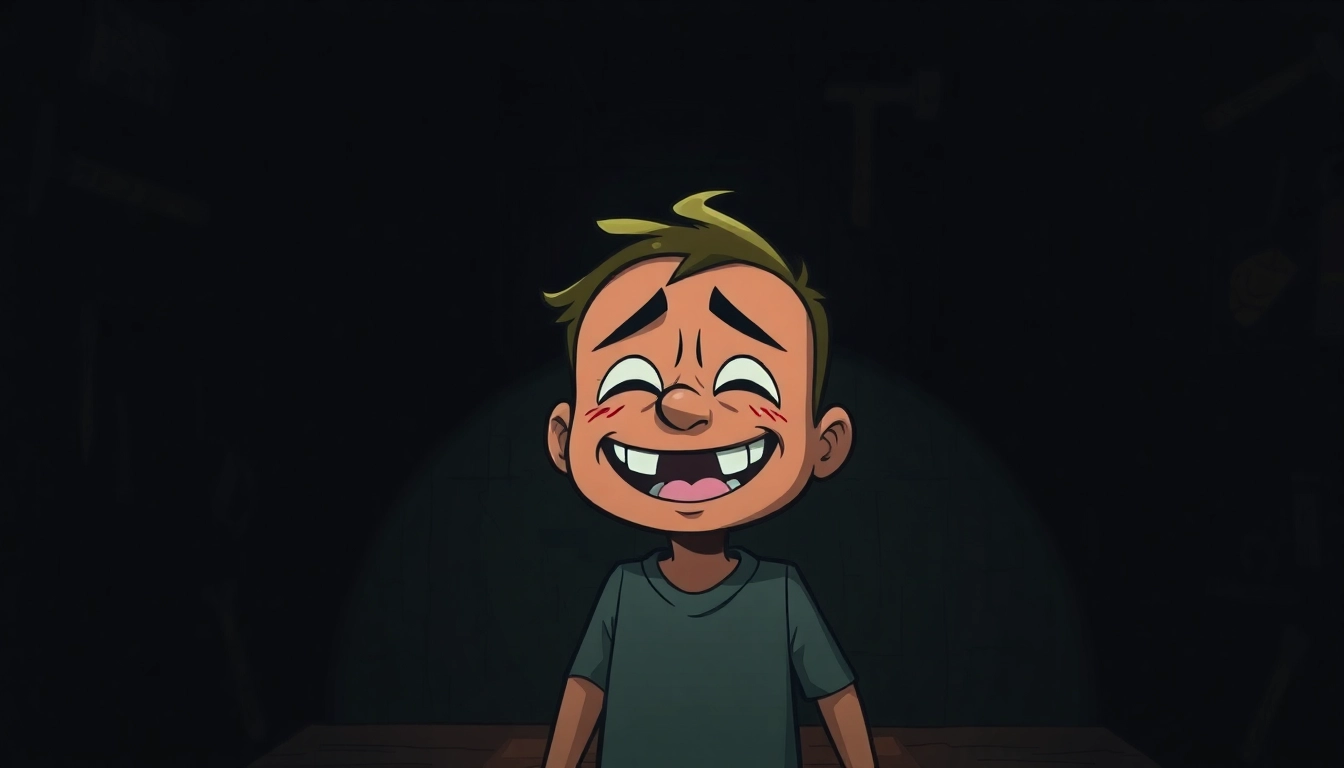Overview and Context: An Introduction to BLOODMONEY, the Dark Clicker Experience
In the realm of psychological horror and morally challenging gameplay, bloddmoney game stands out as a haunting testament to how interactive media can interrogate human morality. This dark clicker game places players in an intensely distressing scenario where every action, every click, is fraught with moral implications. The game’s premise is simple yet profoundly disturbing: you are diagnosed with a life-threatening condition and need $25,000 for urgent medical treatment. With limited options, a strange figure named Harvey offers a disturbing proposition—click on him repeatedly to generate the money you need. But as you delve deeper into this grim bargain, the game reveals its true nature: each click causes Harvey pain, and the tools you purchase from the shop become progressively more violent, pushing the boundaries of what players are willing to accept in the name of survival.
The Mechanics of BloodMoney: Clicking, Upgrades, and Moral Choices
Core Gameplay and Clicking Mechanics
At its core, blood money game harvey employs a straightforward mechanic: players click on Harvey to earn money. Each click adds a dollar to the player’s total, creating an addictive loop that compels players to continue despite mounting discomfort. Initially, Harvey appears cheerful and innocent, almost too naive for the dark path the game sets him on. The more you click, the more money you accumulate, but at a cost—Harvey’s suffering becomes visibly more intense with each interaction.
Upgrade System and Increasing Disturbance
As the game progresses, players can purchase upgrades from the in-game shop. These upgrades include tools like needles, scissors, hammers, and even more grotesque weapons. Each purchase boosts the amount earned per click, but it also heightens Harvey’s pain and suffering. The game cleverly balances this risk-reward dynamic: do you choose the minimal harm options, or do you maximize profits regardless of the human toll? The visual and emotional impact of these upgrades is profound; Harvey’s reactions become more distressed, and his visual deterioration reflects the moral descent of the player’s choices.
Multiple Pathways and Moral Divergence
BloodMoney doesn’t lock players into a single moral trajectory. Instead, it offers multiple pathways—minimal harm, moderate violence, or maximum efficiency. These paths influence the game’s ending and the moral message conveyed. For instance, choosing the least harmful options might lead to the ‘Good Ending,’ where Harvey’s suffering is minimal, and the player’s morality remains relatively intact. Conversely, opting for the most violent tools leads to the ‘Bad Ending,’ emphasizing profit over humanity. The game’s subtle tracking of choices ensures that each playthrough feels unique, and the moral complexity deepens with every decision.
Dark Narrative and Psychological Horror Elements
The Unsettling Atmosphere
From the moment you meet Harvey, the game employs visual cues, dialogue, and sound design to cultivate an increasingly unsettling atmosphere. Harvey’s cheerful demeanor gradually erodes as his pain escalates, with visual distortions and disturbing imagery subtly creeping in. The game effectively uses minimalistic yet impactful cues—Harvey’s eyes widening in fear, his trembling hands, or the subtle change in his voice—to amplify discomfort. This emotional manipulation challenges players to confront their own moral boundaries and the psychological toll of their choices.
Visual Cues and Narrative Subtext
Throughout gameplay, players notice that Harvey seems unaware of the true nature of the tools being purchased. For example, when offered a hammer, Harvey appears surprised, almost confused, as if he didn’t expect such violence. This detail suggests that Harvey might be innocent or perhaps oblivious, adding a layer of moral ambiguity. Is Harvey genuinely suffering, or is he a symbol of innocence caught in a cruel game? These narrative nuances deepen the psychological horror, forcing players to question not only their actions but also the nature of innocence and complicity.
The Time Pressure and Urgency of Survival
Time is a relentless factor in BLOODMONEY. The player’s goal of raising $25,000 creates a sense of urgency, pushing the player to maximize clicks and upgrades rapidly. This ticking clock enhances the tension, making every decision more consequential. The pressure to reach the target quickly can lead players to make morally questionable choices—purchasing violent tools early on or ignoring Harvey’s suffering for the sake of profit. This dynamic underscores a core theme: how desperation can distort moral judgment and lead to dark decisions.
The Multiple Endings: Consequences of Choice
The Good Ending
Opting for minimal harm and choosing less violent upgrades results in the ‘Good Ending.’ Here, Harvey’s suffering is kept to a minimum, and the game concludes with a sense of moral redemption. This ending emphasizes that even within a dark context, compassion and restraint are possible. It also leaves players reflecting on the importance of morality amidst dire circumstances.
The Normal Ending
The ‘Normal Ending’ is achieved through a balanced approach—using some violence but not to the extreme. Harvey’s suffering is moderate, and the player’s moral compromise is evident but not overwhelming. This ending acts as a middle ground, illustrating that survival often comes with moral costs, but they can be managed to avoid total destruction of conscience.
The Bad Ending
Maximizing profit at all costs, purchasing the most violent tools like hammers or knives, leads to the ‘Bad Ending.’ Harvey’s pain is excruciatingly visible, and the game’s visuals become increasingly grotesque. This ending symbolizes moral decay and the dehumanization that can occur when greed and desperation override empathy. It starkly questions whether survival is worth sacrificing one’s humanity.
Community Insights and Player Experiences
Players around the world have shared their reactions and insights into BLOODMONEY, often highlighting its emotional impact. Many report feeling genuine guilt or discomfort after aggressive choices, with some noting that Harvey’s reactions seem almost too human. Discussions on forums like Reddit reveal theories about Harvey’s true nature—whether he’s a real person, a construct of the game’s subconscious, or a symbol of innocence lost.
Content creators and streamers have crafted gameplay videos that showcase different pathways and endings, emphasizing the game’s replayability and moral complexity. These videos often include emotional commentary, revealing how the game’s design can evoke empathy, horror, or philosophical reflection in players.
The Deeper Meaning: Humanity, Morality, and Desperation
Testing Human Nature
At its core, BLOODMONEY functions as a moral experiment. Harvey serves as a mirror of innocence, while the shop and tools symbolize darker human impulses. The game asks: How much are you willing to sacrifice your morality for self-preservation? The subtle cues—Harvey’s surprise at violent tools, his changing expressions—invite reflection on whether we are inherently good or evil when faced with extreme circumstances.
Psychological Reflection
The emotional responses evoked during gameplay—guilt, shame, discomfort—are deliberate design choices. They force players to confront uncomfortable truths about human nature and the capacity for moral compromise. The game’s success lies in its ability to make players question their own boundaries, challenging the notion of morality in a world driven by survival instincts.
Conclusion: Is Survival Worth the Moral Cost?
BloodMoney stands as a provocative exploration of morality under pressure. Its gameplay mechanics, narrative depth, and emotional impact combine to create a haunting experience that stays with players long after the screen goes dark. The game invites reflection on how far we are willing to go when faced with life-and-death situations—and whether true morality can survive such extreme tests.
In the end, the question remains: when your life is at stake, is survival worth the moral compromise? The game’s multiple endings serve as powerful reminders that every choice has consequences, and that sometimes, the line between good and evil is disturbingly thin. The dark journey through BLOODMONEY challenges us to examine our own values and the true cost of survival.
For those intrigued by this disturbing psychological odyssey, exploring the bloddmoney game provides not just entertainment, but a mirror to our human nature—testing whether our morality is fragile or resilient when faced with the darkest of circumstances.

